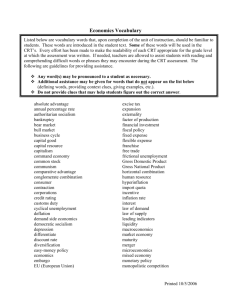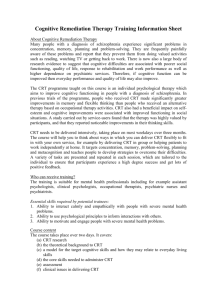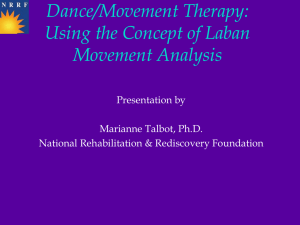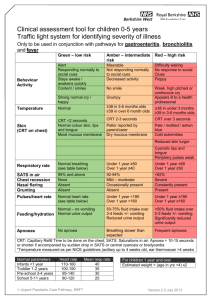Leadership Briefing Outline
advertisement
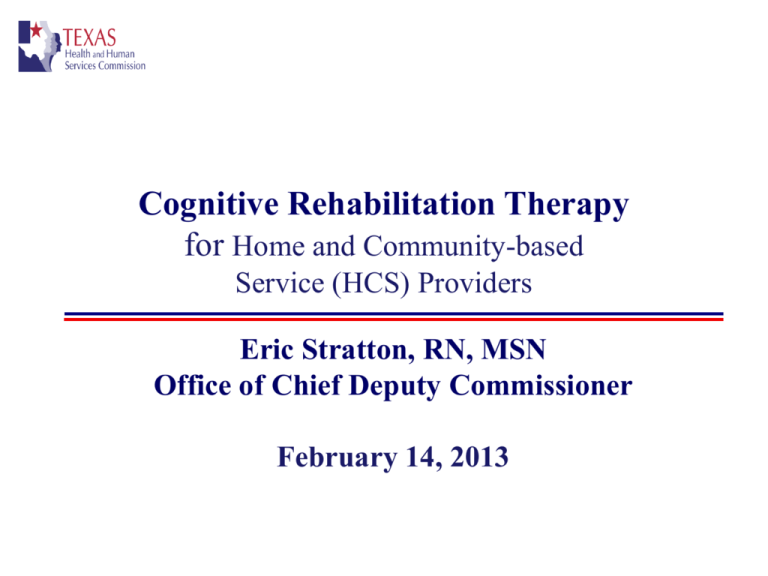
Cognitive Rehabilitation Therapy for Home and Community-based Service (HCS) Providers Eric Stratton, RN, MSN Office of Chief Deputy Commissioner February 14, 2013 Objectives • Define Cognitive Rehabilitation Therapy (CRT) • Explain history of CRT and legislative intent • Convey the value of CRT as evidence based practice which can improve outcomes • Provide instruction on how to help individuals access CRT • Explain who are qualified providers for HCS Page 2 CRT Waiver Service Definition Cognitive rehabilitation therapy is a service that assists an individual in learning or relearning cognitive skills that have been lost or altered as a result of damage to brain cells/chemistry in order to enable the individual to compensate for the lost cognitive functions. Cognitive rehabilitation therapy is provided when determined to be medically necessary through an assessment conducted by an appropriate professional. Cognitive rehabilitation therapy is provided in accordance with the plan of care developed by the assessor, and includes reinforcing, strengthening, or reestablishing previously learned patterns of behavior, or establishing new patterns of cognitive activity or compensatory mechanisms for impaired neurological systems. Page 3 CRT Overview • Learning/relearning cognitive skills after brain damage • Traumatic Brain Injury (TBI) • Acquired Brain Injury (ABI) • Assessment determines medical need for CRT • Neurobehavioral OR Neuropsychological • Covered under State Plan • Qualified Providers of CRT Services • Psychologists • Occupational Therapists (OT) • Speech and Language Pathologists (SLP) Page 4 CRT History & Legislative Intent • CRT is evidence based treatment for ABI • 2006: TBI Advisory Council Report on ABI and Long-term Care in Texas • Report to 80th Legislature on gaps in services for brain injury survivors in Texas • No care coordination, long waiting periods • 2007: LBB report to 80th Legislature recommending TBI coverage through Medicaid • 2008: HHSC Office of ABI established • Funded by budget rider in 80th Legislature • Serves as state lead coordinator for TBI and ABI Page 5 CRT History & Legislative Intent • 2009: Rider 66, SB 1, 81st Legislature (R) • Feasibility study regarding need for system of community support & residential services for ABI • Concluded separate ABI waiver program was best • 2011: 82nd Legislature • Budget Crunch – no action taken • Further study by HHSC Office of Acquired Brain Injury and Texas TBI Advisory Council in interim • 2013: 83rd Legislature • HHSC requests to add new CRT service to CLASS, HCS, CBA, & STAR-Plus HCBS for ABI clients • Legislature funded $1.9 million (GR) for biennium Page 6 CRT History: What Other States Are Doing* • At least 23 states have a 1915(c) waiver program specifically for individuals with brain injury • 11 states include services for both ABI and TBI • MS & FL add Spinal Cord Injury • Level of Care • 14 states have nursing facility level of care • 4 states have hospital level of care • IA, MD, MN include multiple levels of care • Age requirements • 12 states limit to adults only • 5 states cover services from infancy * Data as reported from CMS and HHSC OABI Rider 66 Feasibility Study 2009. Page 7 CRT: Evidence-Based Practice • CRT “attempts to enhance functioning and independence in patients with cognitive impairments as a result of brain damage or disease (IOM, 2011, p. 76) • Neurological disorders affecting CRT patients (Solhberg, Mateer, 2001, p. 25) • • • • • TBI Stroke Hypoxic-hypotensive injury Encephalitis and other infectious disorders Brain tumors • Collectively diagnoses are ABI Page 8 CRT: Evidence-Based Practice Cicerone, K., Langerbahn, D., et al. Evidence-Based Cognitive Rehabilitation: Updated Review of the Literature From 2003 Through 2008. Archives of Physical Medicine and Rehabilitation, Vol 92, Apr 2011, 519-527. Institute of Medicine. Cognitive Rehabilitation Therapy for Traumatic Brain Injury: Evaluating the Evidence. 2011. The National Academies Press. Rohling, Faust, et al. Effectiveness of cognitive rehabilitation following acquired brain injury: A meta-analytic reexamination of Cicerone et al.'s (2000, 2005) systematic reviews. Neuropsychology, Vol 23(1), Jan 2009, 20-39. doi: 10.1037/a0013659 Sohlberg, M.M., Mateer, C.A. Cognitive Rehabilitation: An Integrative Neuropsychological Approach. 2001. Guilford Press. Page 9 Definition: Cognitive Rehabilitation Therapy Cognitive rehabilitation therapy--A service that: assists an individual in learning or relearning cognitive skills that have been lost or altered as a result of damage to brain cells or brain chemistry in order to enable the individual to compensate for lost cognitive functions; and includes reinforcing, strengthening, or reestablishing previously learned patterns of behavior, or establishing new patterns of cognitive activity or compensatory mechanisms for impaired neurological systems. Page 10 Service Delivery: CRT The program provider or CDS Employer must ensure that: • Cognitive rehabilitation therapy is provided in accordance with the individual's PDP, IPC, implementation plan, and with Appendix C of the HCS Program waiver application approved by CMS and found at www.dads.state.tx.us • If the service planning team determines that an individual may need cognitive rehabilitation therapy, the program provider, in coordination with the service coordinator: • assists the individual in obtaining an assessment and plan of care for the cognitive rehabilitation therapy from a qualified professional in accordance with the Medicaid State Plan; and • has a qualified professional provide and monitor the provision of cognitive rehabilitation therapy to the individual in accordance with the plan of care Page 11 Provider Requirements: CRT The program provider or, if using the CDS option, CDS employer and Financial Management Services Agency must ensure that a service provider of cognitive rehabilitation therapy is: a psychologist licensed in accordance with Texas Occupations Code, Chapter 501; a speech-language pathologist licensed in accordance with Texas Occupations Code, Chapter 401; or an occupational therapist licensed in accordance with Texas Occupations Code, Chapter 454. Page 12 Service Delivery: CRT The program provider or CDS employer must: Together with an individual's service coordinator, ensure the coordination and compatibility of HCS Program services with non-HCS Program services Page 13 CRT Process and Procedure ASSESSMENT Neuropsychological HCS Service Diagnosis ABI OR CRT Neurobehavioral State Plan Assessments: “Gatekeepers” to CRT Service Page 14 CRT Process and Procedure: Assessments 1. Neuropsychological Assessment (State Plan) • Includes treatment plan in the assessment • Conducted by Psychiatrist, Psychologist, or LPA under the supervision of a licensed psychologist • CRT Assessment “in reality” • Conducted by NEURO-psychologist OR 2. Neurobehavioral Assessment (State Plan) • Conducted by physician, PA, or NP • Must result in treatment plan with assessment Individual referred to OT/SLP for CRT in HCS (only if assessment warrants it) Page 15 Entering CRT in CARE • CARE ID CRT Event type CRT or CRTV (CDS) • Units Billed in 15 minute increments using standard rounding rules. • CDS billed in dollars. Page 16 HHSC/DADS Contacts Eric Stratton, RN, MSN Policy Analyst Health and Human Services Commission Office of Chief Deputy Commissioner Eric.Stratton@hhsc.state.tx.us (512) 487-3372 Curtis Walters HCS Program Specialist Department of Aging and Disabilities Services Center for Policy and Innovation hcs@dads.state.tx.us Send questions related to CDS to cds@dasd.state.tx.us. Page 17

